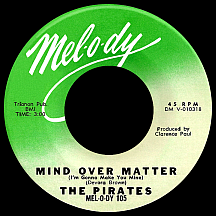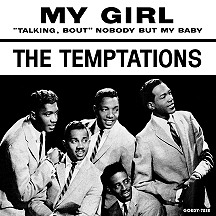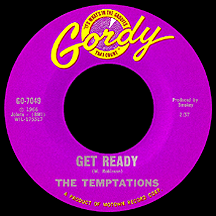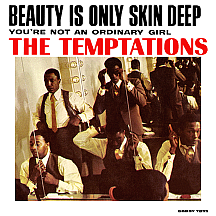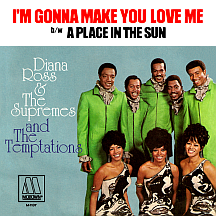THE TEMPTATIONS
The Distants came together in 1959, the first set of building blocks in what eventually became one of the greatest of all Motown acts. Three Distants plus two Primes equaled an 80-percent-complete blend of voices and personality. Later, when a stray solo singer supplied the final element, The Temptations were primed to leave all other male Detroit groups in the distance...and they did.
Otis Williams is the man with whom the Temptations begin and end. Born in Texarkana, Texas in 1941, he was unusually superstitious (it's bad luck to eat shelled peanuts in a car!) but also possessed a highly adaptable midrange vocal quality and a predisposition for organization...which would come in handy when five diverse individuals found themselves living in close quarters (say, a tour bus) for weeks at a time. His group the Distants recorded one single for the Northern label towards the end of 1959 and with the help of happenin' afternoon deejay "Frantic" Ernie Durham of Detroit's WJLB, "Come On" became a fair-sized local hit. Warwick Records picked up the single and made an effort to promote it in other markets, but it just didn't fly. One follow-up single, "Always," was the last hard evidence of the Distants' brief moment of upper midwest glory.
Melvin Franklin's name was really David English (Franklin came from his stepdad, Melvin was his middle name). Born in 1942, he suffered early from diabetes and complications thereof. When his voice changed, out came a booming bass sound that would later make him millions of dollars. As a child, he loved comic books and was still following the adventures of the Marvel superheroes in the '60s. He knew Otis from Northwestern High School (Smokey Robinson too) and, with friend Pee Wee Crawford, joined the Distants in time to put his stamp on those first pre-Temptations records.
Elbridge Bryant, Al for short, moved to Detroit from Thomasville, Georgia. A little older than the other Distants (already 20 when "Come On" hit the Detroit airwaves in early '60), he made the cut when the Temptations stormed Hitsville U.S.A., but also became the group's first casualty. Al took to drink well before his 21st birthday and quickly proved he couldn't hold his liquor; erratic behavior at times became confrontational and even a tad dangerous.
Eddie Kendrick (changed to Kendricks at some point) was the youthful-looking, "cute" one in a lineup of sharp-dressed lady killers...his infectious falsetto endeared him to fans (women in particular). Born in Birmingham, Alabama in 1939, he was an easy choice for inclusion in The Primes as the high end of a three-way harmony act. They even had a sister group, The Primettes, four high school girls who a few years later, when pared to three, led the Hitsville pack as The Supremes.
Paul Williams, a friend of Eddie's from Birmingham, might have ended up being a shoe repairman; at least that was the career his parents had planned for him. Instead, he and Eddie joined with Kell Osborne and tried their luck as the Primes, finding it wasn't that easy to make a name among Detroit's vocal group acts...or even get noticed. While the Primettes had one single release on the LuPine label in 1962, the Primes never made a record; footwear repair might have seemed a sensible option for Paul had Otis's Distants not come along.
Otis, Melvin, Al, Eddie and Paul pooled their resources and called themselves The Elgins. They auditioned for Mickey Stevenson at Motown and made the grade. Employee Billy Mitchell suggested a new name, The Temptations, a clever (if somewhat boastful) description of the five (the Elgins name didn't languish long; it was later revived for use by another Motown act). "Oh, Mother of Mine," written by Stevenson and Otis Williams, was their first release on the Miracle label in 1961. Label founder Berry Gordy was sure the group had star quality, but the single and its follow-up, Gordy-Williams-Franklin-Bryant collaboration "Check Yourself," didn't quite hit the mark (though a remake by Chicago soul man Gene Chandler in 1963 caught some regional sales action).
Next they were assigned to the newly-established Gordy label and hit the R&B charts in May '62 with Berry Gordy's "Dream Come True," followed by "Paradise," which made headway in a smattering of radio markets. In search of a formula that would put the guys on top, Gordy shelved the Temptations moniker and recorded them as The Pirates, covering "Mind Over Matter," a single just released by Nolan Strong (Motown singer-songwriter Barrett Strong's cousin) on Fortune, a Detroit label co-owned by Devora Brown, who composed the song. The Pirates' version, on Motown's Mel-o-dy subsidiary, competed head-to-head with Strong for airplay in the fall of '62. The original version came out ahead, though with only minor results.
Leaving this latest, hapless handle to Pittsburgh's baseball team, the group resumed as the Temptations. Smokey Robinson stepped up, expressing a desire to produce and write for them as he had recently done successfully for Mary Wells. "I Want a Love I Can See" was a solid effort but didn't improve the quartet's standing. By this time, Al Bryant's demons had consumed him, and while the group's other members were willing to cut him some slack at first, by December 1963 his actions had gone overboard, threatening to impede what was already slow progress. They banished him from the group.
David Ruffin, a gospel singer with dreams of secular solo stardom, had traveled north to Detroit from Meridian, Mississippi. In 1961, at age 20, he impressed Berry's sister Anna Gordy with his uniquely raw, powerful voice and compellingly promising moves. One single on the Anna label, "I'm in Love," led to two more on Check-Mate (a Chess Records label, of course), including "Action Speaks Louder Than Words," under the supervision of Berry Gordy and Billy Davis. After these records missed the mark, he was more willing to consider joining a group. His affiliation with Gordy led to a fateful meeting with the Temptations in January 1964; he became Bryant's replacement, the missing ingredient in the five-man mix.
"The Way You Do the Things You Do" turned out to be the right song at the right time. Otis, for one, was skeptical of the catchy-but-corny lyrics by Smokey and Miracle Bobby Rogers. 'You got a smile so bright, you know you coulda been a candle...I'm holding you so tight, you know you coulda been a handle...' may have looked silly on paper, but once Eddie's lead vocal and the tight backup of the other four kicked in, it was pure delight. The song took off and just missed the top ten in April '64. Robinson's "I'll Be in Trouble" reached the top 40 three months later. Norman Whitfield (who had previously written a Temptations B side) teamed with Eddie Holland, penning a third hit with a Kendricks lead, "Girl (Why You Wanna Make Me Blue)." Smokey, wishing to continue writing and producing the group, saw this as a challenge; he doubled his efforts and came up with a song that would be the group's signature smash while spotlighting another dynamic lead singer among the ranks of the Tempts.
When it came to concert appearances, the group had worked out some loosely synced choreography that gradually developed into a variety of precisely-timed dance routines. Their wardrobe was stylishly coordinated; in other words, they looked good. As each of the five took his moment in the spotlight on any given night, it was David Ruffin who best took advantage of the opportunity, putting the stage moves he had developed as a solo performer into play. His onstage charisma didn't go unnoticed by Smokey, who approached David with a song he and Rogers had written. "My Girl" was the perfect vehicle for Ruffin's turn as lead singer of the Temptations. Released at the beginning of 1965, it put the group at number one on the charts (pop and R&B) shortly afterward.
The next three Smokey-produced singles went top 20 in 1965, each written by Robinson, Rogers and/or fellow Miracle Pete Moore: "It's Growing," "Since I Lost My Baby" and "My Baby" all featured David Ruffin leads (Paul Williams got his turn as well, with "Don't Look Back," the flip of "My Baby"). 1966 started with a Smokey masterpiece, "Get Ready" (Kendricks back on lead vocal for this one), the group's second number one R&B hit. Whitfield hadn't given up trying to wrest control of the Temptations' hit streak from Robinson, though, and Gordy gave him another shot with "Ain't Too Proud to Beg," featuring Ruffin's passionately pleading lead vocal; while a sizeable pop hit, it took the R&B world by storm, spending most of the summer of '66 at number one on that chart, establishing them as major players beyond the purposely pop-soul productions of most Motown artists. The Temptations had gained credibility on the street. Whitfield was given a simple assignment: come up with more!
After that, the Temptations' solid stream of top 20 pop hits gave way to a barrage of top tens, with several R&B chart-toppers along the way. Whitfield produced compositions he created with the likes of Eddie Holland, Cornelius Grant, Frank Wilson, R. Dean Taylor and Roger Penzabene: 1966 smashes "Beauty is Only Skin Deep" and "(I Know) I'm Losing You" and the 1967 hits "All I Need" and "(Loneliness Made Me Realize) It's You That I Need" showcased David Ruffin as lead singer, while "You're My Everything" featured a co-lead by Kendricks and Ruffin.
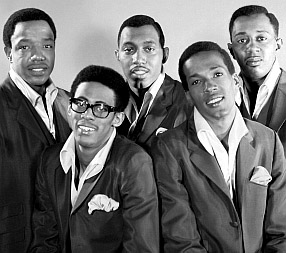
By the time 1968 rolled around, Gordy had put the next move of his master plan into play. Hollywood manager Shelley Berger was commissioned to take the Temptations (and the Supremes) to the next level, and through Berger's vast connections, both acts were booked to perform at prestigious night spots like New York's Copacabana. A variety special was pitched to the television networks and NBC took the bait. Meanwhile, David Ruffin's voice was still at the forefront of Tempts hits like "I Wish it Would Rain" and "I Could Never Love Another (After Loving You)," both written by Whitfield, Penzabene and Barrett Strong. When the Supremes became known as Diana Ross and the Supremes a year earlier, the idea went straight to his head; he approached Gordy and demanded the act's name be changed to David Ruffin and the Temptations! Berry's marketing concept, of course, was different for each group, and he refused. David was difficult to work with after that, often showing up late for performances and studio dates, if at all. Noting the success his older brother, Jimmy Ruffin, had recently attained with Motown, he made the decision to go solo and no one contested it. "Please Return Your Love to Me," in the summer of '68, was the last single by the group to feature a vocal by David.
Dennis Edwards, another Birmingham native, sang in church as a child and followed a gospel path as a teenager when his family moved to Detroit. After kicking around town for several years without much luck, he was hired in 1967 by The Contours (some five years after "Do You Love Me" had established them). The group broke up soon after. Timing worked in his favor, though, when Ruffin's exit from the Temptations left an opening. Whitfield had decided to take the music of the Temptations in a new, "relevant" direction, though it took some effort to persuade the skeptical Gordy and the singers themselves. Once convinced to at least try it, Otis, Melvin, Eddie and Paul agreed on one thing: Dennis had a vocal style that was just right for what Whitfield had in mind.
It was as if "Cloud Nine" had been recorded by a different group altogether. The familiar mix of voices achieved a result far removed from any previous effort behind a commanding lead vocal by Edwards; a tale of inner city frustration and seemingly easy escape ('...you're a million miles from reality') was widely interpreted as a pro-drug song, though Whitfield denied it while acknowledging Sly and the Family Stone's recent emergence as inspiration for the direction he had taken with the Temptations' music. At any rate, the song was an instant hit at the end of '68 and a Grammy winner a few months later, amazingly the first Motown recording NARAS voters had seen fit to honor.
Meanwhile, the planned TV variety special premiered to rave reviews and huge ratings: TCB (Takin' Care of Business) starring Diana Ross and the Supremes with the Temptations aired December 9, spawning a hit single, "I'm Gonna Make You Love Me" and two follow-ups, in addition to a soundtrack album that hit number one in February '69. David Ruffin, missing out on the high-profile TV exposure, had little reason for regret; he reached the top ten with his first solo 45, "My Whole World Ended (The Moment You Left Me)," in March.
Whitfield was a taskmaster, but the Temptations had many major hits as a result. "Run Away Child, Running Wild" and "Don't Let the Joneses Get You Down" touched on issues relatable to the black community. "I Can't Get Next To You," their second number one pop hit, combined conventional lyrics with the new production style to close the decade on a high note. "Psychedelic Shack" and "Ball of Confusion" made statements as biting as anything on the 1970 airwaves. "Just My Imagination" was the highlight of '71, an intricately-arranged ballad with a Kendricks lead vocal, the group's third number one hit.
Richard Street was the fifth member of the Distants who, with Pee Wee Crawford, hadn't made the Temptations' initial short list back in '61. He headed up a new Distants lineup and worked with producer Whitfield before joining The Majestics, who as The Monitors released a series of singles on Motown's V.I.P. label including "Say You" and "Greetings (This is Uncle Sam)" in 1966. Reuniting with former partners Otis and Melvin, Richard filled in for Paul Williams in the early 1970s. Paul's drinking impeded his ability to perform onstage, forcing a hiatus with the condition that he would be welcomed back when ready. After a time it became obvious he wouldn't be returning and Richard became his permanent replacement in 1971.
As Ruffin had done, Eddie Kendricks made the decision to pursue a solo career. He left in 1971 and was replaced by Ricky Owens of The Vibrations, who lasted only a short time before Damon Harris came on board and stayed for a few years. Kendricks had a consistent run on the charts lasting several years; he hit number one in 1973 with "Keep on Truckin'" and number two in '74 with "Boogie Down." David Ruffin found his way back to the top ten in 1976 with "Walk Away From Love."
The Temptations endured even more roster substitutions. Before Edwards departed, they recorded "Papa Was a Rollin' Stone" and "Masterpiece," the former hitting number one in December '72 and winning them three more Grammys at the March 1973 ceremony. Norman Whitfield's workhorse production demands eventually caused a rift and the group began working with other producers that year, but there were no further hits of a Whitfield-sized caliber. They left Motown for Atlantic Records later in the decade, yet struggled further and returned to Motown and the Gordy label in 1979. In 1982, Otis, Melvin, Eddie, Paul and David reunited, along with Dennis Edwards and newer member Glenn Leonard. The seven-man act toured to standing-room-only crowds, capturing their former glory and even expanding upon it!
Ultimately, the story of the Temptations is one of glory and tragedy. After leaving the group, Paul Williams suffered from mental and emotional issues deeper than those close to him realized; he went into a tailspin from which he never recovered and committed suicide in August 1973 at age 34, though under suspicious circumstances that suggested foul play. 36-year-old Elbridge Bryant succumbed to cirrhosis of the liver, likely brought on by his heavy drinking, in October 1975. In June 1991, David Ruffin died of a drug overdose at age 50. Lung cancer claimed 52-year-old Eddie Kendricks in October 1992. Multiple health issues contributed to the problems Melvin Franklin experienced for much of his life; he was just 52 when he passed away in February 1995. With Otis Williams and other surviving members, The Temptations formed a legacy that lives and breathes.
NOTABLE SINGLES:
- Come On - 1960
by the Distants - Oh, Mother of Mine - 1961
- Check Yourself - 1961
- Mind Over Matter (I'm Gonna Make You Mine) - 1962
as the Pirates - Dream Come True - 1962
- Paradise - 1962
- I Want a Love I Can See - 1963
- The Way You Do the Things You Do - 1964
- I'll Be in Trouble /
The Girl's Alright With Me - 1964 - Girl (Why You Wanna Make Me Blue) - 1964
- My Girl - 1965
- It's Growing - 1965
- Since I Lost My Baby - 1965
- My Baby /
Don't Look Back - 1965 - Get Ready - 1966
- Ain't Too Proud To Beg - 1966
- Beauty is Only Skin Deep - 1966
- (I Know) I'm Losing You - 1966
- All I Need - 1967
- You're My Everything - 1967
- (Loneliness Made Me Realize) It's You That I Need - 1967
- I Wish it Would Rain /
I Truly, Truly Believe - 1968 - I Could Never Love Another (After Loving You) - 1968
- Please Return Your Love To Me - 1968
- Cloud Nine - 1968
- I'm Gonna Make You Love Me - 1969
by Diana Ross and the Supremes and the Temptations - Run Away Child, Running Wild - 1969
- I'll Try Something New - 1969
by Diana Ross and the Supremes and the Temptations - Don't Let the Joneses Get You Down - 1969
- I Can't Get Next To You - 1969
- The Weight - 1969
by Diana Ross and the Supremes and the Temptations - Psychedelic Shack - 1970
- Ball of Confusion - 1970
- Ungena Za Ulimwengu (Unite the World) - 1970
- Just My Imagination (Running Away With Me) - 1971
- Superstar (Remember How You Got Where You Are) - 1971
- Take a Look Around - 1972
- Papa Was a Rollin' Stone - 1972
- Masterpiece - 1973


